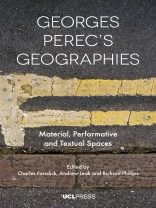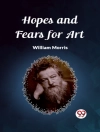Georges Perec, novelist, filmmaker and essayist, was one of the most inventive and original writers of the twentieth century. A fascinating aspect of his work is its intrinsically geographical nature. With major projects on space and place, Perec’s writing speaks to a variety of geographical, urban and architectural concerns, both in a substantive way, including a focus on cities, streets, homes and apartments, and in a methodological way, experimenting with methods of urban exploration and observation, classification, enumeration and taxonomy.
Georges Perec’s Geographies is the first book to offer a rounded picture of Perec’s geographical interests. Divided into two parts, Part I, Perec’s Geographies, explores the geographies within Perec’s work in film, literature and radio, from descriptions of streets to the spaces of his texts, while Part II, Perecquian Geographies, explores geographies in a range of material and metaphorical forms, including photographic essays, soundscapes, theatre, dance and writing, created by those directly inspired by Perec.
Georges Perec’s Geographies extends the body of Perec criticism beyond Literary and French Studies to disciplines including Geography, Urban Studies, Planning and Architecture to offer a complete and systematic examination of Georges Perec’s geographies. The diversity of readings and approaches will be of interest not only to Perec readers and fans but to students and researchers across these subjects.
Praise for Georges Perec’s Geographies
‘This collection of essays … is Perecquian in all the best ways. It’s intelligent, systematic, and comprehensive, and at the same time playful and creative with its topic. The book as a whole is a delight: an excellent academic resource for those interested in Perec and the representation of space (especially urban space) and a celebration of how his unique approach to his environment has inspired a new generation of creative practitioners.’
French Studies: A Quarterly Review
Inhoudsopgave
Introduction: Georges Perec’s geographies; Perecquian geographies
Richard Phillips, Andrew Leak and Charles Forsdick
1. The mapping of loss
Andrew Leak
2. ‘Entre Frence et Engleterre: toponyms and the poetics of reference in Perec’s fiction
Derek Schilling
3. The subject and the city in Un homme qui dort
Julia Dobson
4. Poetics of scale: Perec and Gaullism
Douglas Smith
5. Accumulation versus Dispersion: Perec and ‘his’ diaspora
Anna-Louise Milne
6. Islands, camps, zones: towards a nissological reading of Perec
Amanda Crawley Jackson
7. Textual, audio and physical space: adapting Perec’s radio plays for theatre
Christopher Hall
Perecquian Geographies
8. Perecquian soundscapes
Alasdair Pettinger
9. Perecquian spaces for performance practices
Oliver Bray
10. Embodiment and everyday space: dancing with Perec
Leslie Satin
11. Seeing more flatly: the Regional Book
David Matless
12. Endotic Englishness: Meades and Perec
Daryl Martin
13. Perecquian photography inside and outside the field: fairgrounds xxx
Ian Trowell
14. Photographic investigation of the infraordinary
Joanne Lee
15. When nothing happens in Huddersfield
Kevin Boniface
Over de auteur
Richard Phillips is Professor of Cultural Geography at the University of Sheffield. His books include Mapping Men and Empire: A Geography of Adventure (1997), Sex, Politics and Empire (2006), Fieldwork for Human Geography (2012) and Creative Writing for Social Research (forthcoming).












